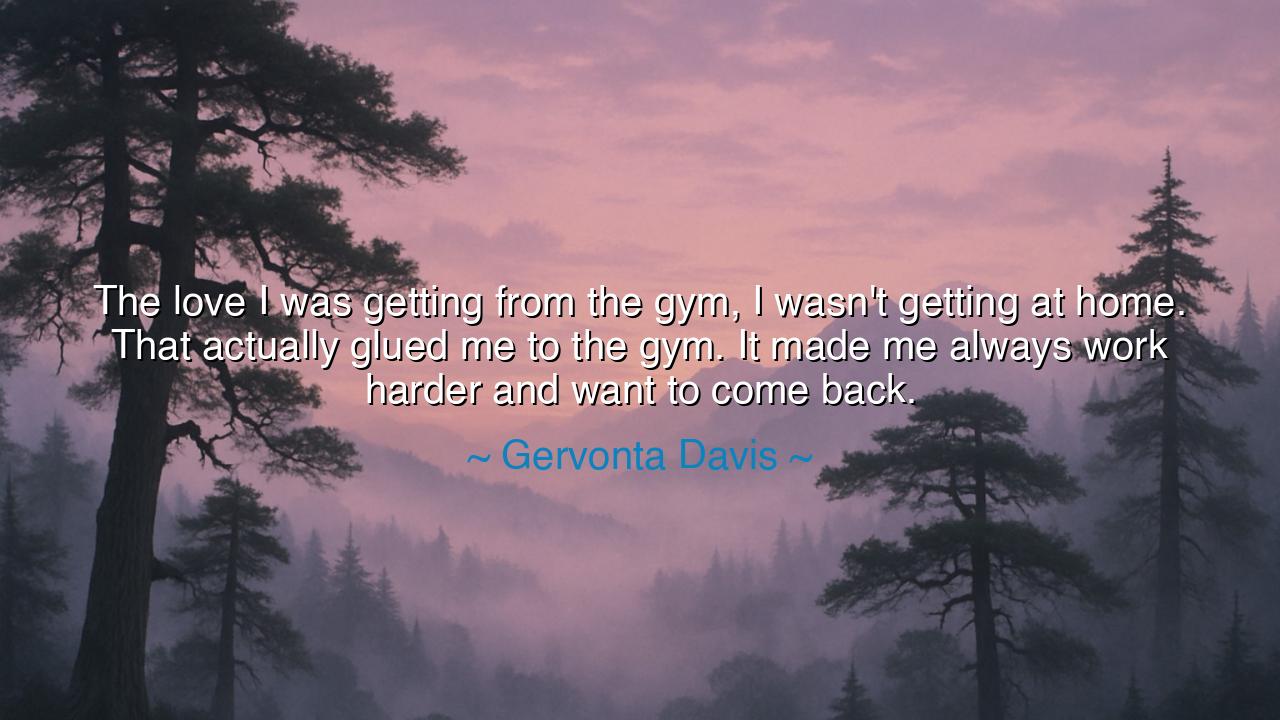
The love I was getting from the gym, I wasn't getting at home.
The love I was getting from the gym, I wasn't getting at home. That actually glued me to the gym. It made me always work harder and want to come back.






In the words of Gervonta Davis, “The love I was getting from the gym, I wasn’t getting at home. That actually glued me to the gym. It made me always work harder and want to come back.” — there burns a confession born not of weakness, but of transformation. It is the voice of a soul that turned pain into purpose, that found in the clang of iron and the discipline of training the warmth that life had denied him elsewhere. His words speak to one of the oldest truths known to humankind — that the heart, though wounded, will always seek a place to belong. When that belonging is not found in the cradle of family, it will be forged in the fire of passion.
In the ancient world, warriors, philosophers, and artists alike spoke of such transformation — of turning loss into strength, isolation into excellence. What Davis found in the gym is what the Greeks called arete — the pursuit of excellence that gives meaning to existence. Deprived of affection at home, he discovered in the discipline of training not only a refuge, but a new family, a sanctuary where effort and sweat replaced words of affection. The gym became his temple, the ring his altar, and each drop of sweat a silent offering to the gods of perseverance. Through struggle, he found love; through labor, he found identity.
There is a powerful and ancient resonance in this — for even the greatest heroes of myth and history have been shaped not by comfort, but by the hunger to be seen. Consider Spartacus, the gladiator who rose from slavery to lead a rebellion. In the arena, he was trained not for joy but for survival; yet within that arena, he found power, dignity, and purpose. What had been meant to break him instead forged him. So it is with Davis: what began as escape became transformation. The gym did not simply strengthen his body — it restored his soul. It offered him what life had withheld: recognition, belonging, and love earned through effort rather than inheritance.
His words reveal something universal: that love need not always come from people — it can come from purpose. When the world grows cold, the human spirit will seek warmth wherever it can. For some, it is found in art; for others, in work, faith, or craft. Davis found it in the rhythm of the bag, the sting of the gloves, the silence between rounds. The gym became more than a physical space; it was a teacher, a mentor, and a mirror that reflected the man he was becoming. The love he felt there was not sentimental — it was the love of progress, the love of challenge, the love of self-worth reborn through mastery.
Yet there is a bittersweet truth within his words. The love that drove him to the gym was born of absence — a void that can never be fully filled. The ancients warned that greatness born of pain must be tempered with self-awareness, lest it consume the soul it strengthens. In this way, Davis’s journey reminds us that we must honor both the strength that pain gives us and the tenderness it withholds. The gym may replace the home, but it cannot heal it entirely. To grow whole, one must eventually turn back toward the wounds that first drove them to seek strength.
Still, there is glory in what Davis discovered — for he chose creation over destruction. Many who are unloved turn their pain outward, toward bitterness or violence. But he, like a craftsman at his forge, shaped his suffering into power. In this, he stands among those the ancients called heroes — not because of their victories, but because of their endurance. His love for the gym is not a love of walls or weights, but of redemption — the sacred process of rebuilding oneself from the ruins of neglect. In this way, his story becomes not just his own, but a parable for all who have been hardened by loss yet still yearn for belonging.
So let the lesson be this: wherever you find love, let it lift you, not consume you. If life denies you affection, seek purpose; if it gives you silence, create your own song. Find the place that awakens your spirit and return to it, as Davis returned to the gym — not for escape, but for transformation. Let your labor become your language, your discipline your devotion. For as the ancients knew, the gods do not dwell in comfort — they are born in struggle, in motion, in the relentless pursuit of the self that will not give up.
And when you stand, like Gervonta Davis, in the place that once held your pain but now holds your strength, remember this: the love you create for yourself will always outlast the love you were denied. In that truth lies the essence of greatness — to turn the absence of love into the art of becoming.






AAdministratorAdministrator
Welcome, honored guests. Please leave a comment, we will respond soon